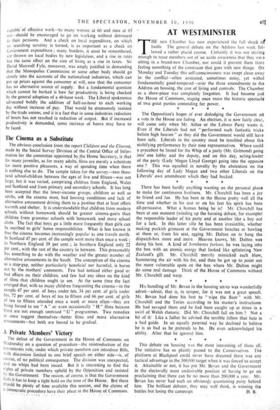The Cinema as a Substitute
The obvious conclusion from the report Children and the Cinema, made by the Social Survey Division of the Central Office of Infor- mation for the committee appointed by,the Home Secretary, is that for many juveniles, as for many adults, films are merely a substitute for more positive pleasures, a way of spending time when there is nothing else to do. The sample taken for the survey—two thou- sand school-children between the ages of five and fifteen—was not large, but it was varied, comprising children from England, Wales and Scotland and from primary and secondary schools. It has long been accepted that the lower-income groups, children as well as adults, ust the cinema most, bad housing conditions and lack of alternative amusement driving them to a pastime that at least offers warmth and shelter. It is understandable that children from modern schools without homework should be greater cinema-goers than children from grammar schools with homework and more school clubs. The fact that boys go a little more frequently than girls can he ascribed to girls' home responsibilities. What is less known is that the cinema becomes increasingly popular as one travels north. In Scotland 47 per cent, of the sample went more than once a week ; in Northern England 39 per cent. ; in Southern England only 22 per cent., with the rest of the country in between. This presumably has something to do with the weather and the greater number of alternative amusements in the South. The conception of the cinema as a stop-gap, neither particularly beneficial nor harmful, is borne out by the mothers' comments. Few had noticed either good or bad effects on their children, and few had any ideas on the kind of films that children ought to see. At the same time the fact emerged that with so many children frequenting the cinema—in the sample 47 per cent, of boys under ten, 34 per cent, of girls under ten, 72 per cent, of boys of ten to fifteen and 66 per cent, of girls of ten to fifteen attended once a week or more oftn—they are being forced to see " A " or even occasionally " H " films because there are not enough unmixed " U " programmes. Two remedies at once Suggest themselves—better films and more alternative amusements—but both are bound to be gradual. .


















































 Previous page
Previous page